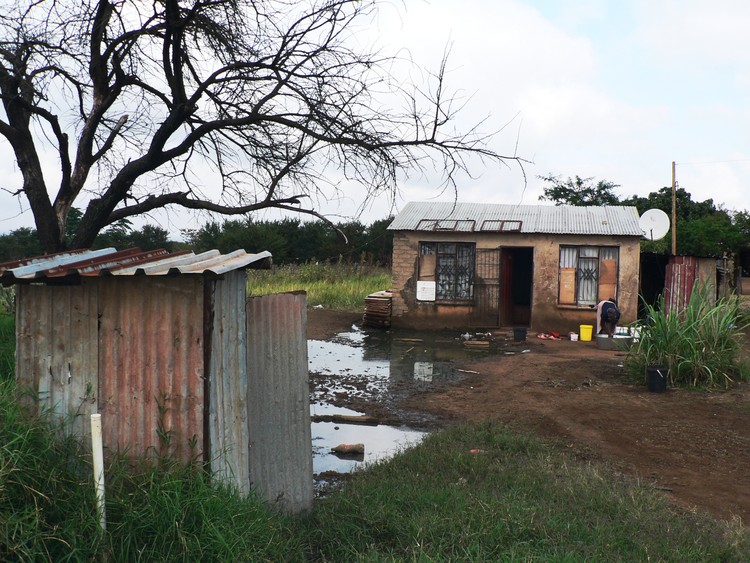Louis Trichardt residents forced to live among pools of sewage
Tired of continual backups into their pipes due to blocked sewer lines, some residents have reverted to pit toilets
This house in Tshikota, Louis Trichardt, occupied by a mother and her four children, is surrounded by a pool of sewage, apparently from overflows from blocked municipal sewer lines. About 20 neighbours are also affected by overflowing sewage. Photo: Bernard Chiguvare
- For years, sewage spills have been affecting the living conditions of residents in Tshikota township, Louis Trichardt.
- A number of other residents have resorted to disconnecting from the municipal sewer line and reverting to pit toilets.
- The district municipality responsible says they are upgrading one line, but blockages that cause the sewage spillage is due to residents throwing foreign objects into the sewerage system.
For a month, stinking sewage has pooled in front of the doorstep of the house tenanted by a 45-year-old mother of four in Tshikota township in Louis Trichardt, extending across half her yard.
The woman, who asked not to be identified, said she made several calls to the Vhembe District Municipality responsible for the infrastructure, and had also spoken to the ward councillor, to no avail.
She said the sewage flows into her yard when the municipality’s sewerage system is blocked. “If we flush the toilet the sewage will not go down the sewer system. It flows out into the whole yard. We are now using the nearby bush as our toilet,” she said.
But while she is the most visibly affected, sewage spills are affecting at least 20 other families across four streets in Tshikota.
Residents say sewage has been overflowing into streets and yards in the township since 2016, with no permanent solution offered by the municipality.
But Vhembe District Municipality spokesperson Matodzi Ralushai said the sewer line was repaired earlier this month, and blamed residents for creating frequent sewer blockages by dumping foreign materials in the system.
Ralushai said the district municipality along with the Department of Cooperative Governance and Traditional Affairs were “in the process” of upgrading one of the main sewer lines in the township from a 200mm to a 300mm line.
“This pipeline which is under construction will join the bulk line which is going to Rietvlei Waste Water Treatment Works,” he said.
But when GroundUp visited Tshikota township on Sunday and Wednesday last week, sewage was still running in two of the streets. In the third street that had been previously affected, the line appeared to have been unblocked, but the sewage overflows in a fourth street had been prevented by residents disconnecting their houses from the municipal line. They had dug pit toilets for themselves in their yards instead.
Angeline Mabobo said the constant backup of sewage into her house led her to abandon her indoor toilet last year and dig a pit toilet instead.
“At first I disconnected the municipal sewerage and then pleaded with my neighbours to use their bathrooms, but that created challenges and pushed me to dig the pit toilet,” said Mabobo.
She said four neighbours who were tenants, moved away from the street due to frequent sewage spills. One of her neighbours had also disconnected the house from the municipal sewerage line and dug a pit toilet in the yard.
South African National Civic Association (SANCO) branch secretary Thabang Tlou said the association was concerned about the continual complaints from residents about sewage spills. Tlou said some residents had told SANCO that when they lodged a complaint with the municipality they were told to get private plumbers. “Yet most of the residents are unemployed. It must be VDM (Vhembe District Municipality) that fixes the sewage,” he said.
But Ralushai dismissed the claim. “That is not the responsibility of the municipality, anybody saying that is not authorised,” he said.
Meanwhile, the district municipality’s water and sanitation 2023/24 capital expenditure budget, used for maintenance, refurbishment, and upgrading of water and sanitation infrastructure, was underspent by R19m. The budget was R122-million, but only R103-million was spent, according to information supplied by Ralushai.
Support independent journalism
Donate using Payfast

Don't miss out on the latest news
We respect your privacy, and promise we won't spam you.
© 2024 GroundUp. This article is licensed under a Creative Commons Attribution-NoDerivatives 4.0 International License.
You may republish this article, so long as you credit the authors and GroundUp, and do not change the text. Please include a link back to the original article.
We put an invisible pixel in the article so that we can count traffic to republishers. All analytics tools are solely on our servers. We do not give our logs to any third party. Logs are deleted after two weeks. We do not use any IP address identifying information except to count regional traffic. We are solely interested in counting hits, not tracking users. If you republish, please do not delete the invisible pixel.

